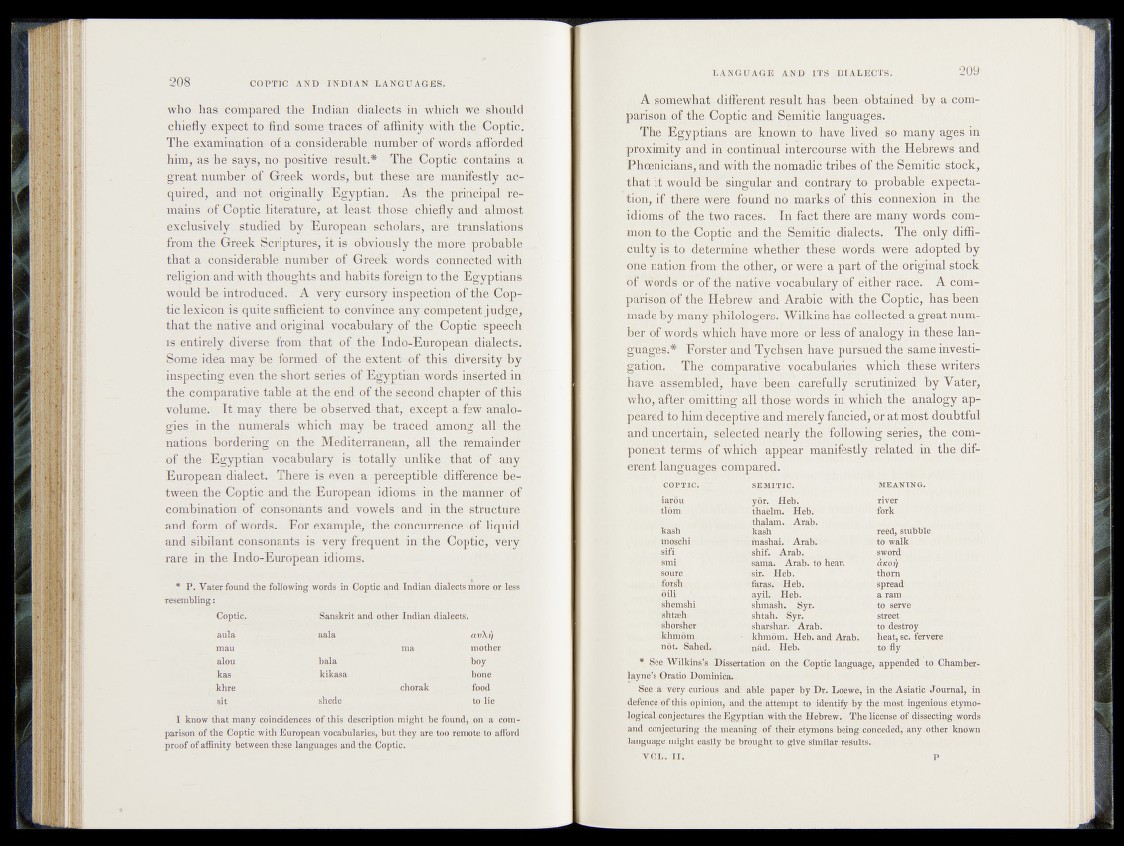
208 COPTIC AND INDIAN LANGUAGES.
who has compared the Indian dialeets in which we should
chiefly expect to find some'traces of affinity with the Coptic.
The examination of a considerable number of words afforded
him, as he says,-no positive result.* The Coptic contains a
great number of Greek words, but these- are manifestly acquired,
and not originally Egyptian. As the principal remains
of Coptic literature, at least those chiefly and almost
exclusively studied by European scholars, are translations
from the Greek Scriptures, it is obviously the more probable
that a considerable number of Greek words connected with
religion and with thoughts and habits foreign to the Egyptians
would be introduced. A very cursory inspection of the Coptic
lexicon is quite sufficient to convince any competent judge,
that the native and original vocabulary of the Coptic speech
is entirely diverse from that of the Indo-European dialects.
Some idea may be formed of the extent- of this diversity by
inspecting even the short series of Egyptian words inserted in
the comparative table at the end of the second chapter of this
volume. It may there be observed that, except a few analogies
in the numerals which may be traced, among all the
nations bordering on the Mediterranean, all the remainder
of the Egyptian vocabulary is totally unlike that of any
European dialect. There is even a perceptible difference bérf
tween the Coptic and the European idioms-in the manner of
combination of consonants and vowels and in the structure
and form of words. For example, the concurrence \pf liquid
and sibilant consonants is very frequent in the Coptic, very
rare in the Indo-European idioms.
* P. Vater found the following words in Coptic and Indian dialects more or less
resembling:
Coptic. _ Sanskrit and other Indian, dialects.
aula aala av\if
mau ma mother
alou bala boy
kas kikasa bone
khre chorak food
sit shede to lie
I know that many coincidences of this description might be found, , on a comparison
of the Coptic with European vocabularies, but they are too remote to afford
proof of affinity between these languages and the Coptic.
A somewhat different result has been obtained by a comparison
of the Coptic and Semitic languages.
Thé Egyptians are known to have .lived so many ages in
proximity and imcontinual intercourse with the Hebrews and
Phoenicians, and with the nomadic tribes of the Semitic stock,
that it would be singular and contrary to probable expecta-
tion, if there were found no marks of this connexion in the
idioms of the 'two races- In fact there are many words èonï-
mon, to the Coptic and the ^SfemMc dialects. The only difficulty
is to determine whether'*tneés Words k were adbpfed;ffy
one nation dreah the other, or were a part1 of the original stock
’Ö? words or'óf the natiyeyocabUlaly of either race'.' A comparison
of the'Hebrew and Arabic witm wè Coptic,' has been
made by many philolögers. Wilkins hascolle'cmdu great number'of
words" which have more or less of analogy in Jpese languages.*
Forster and Tyehsen hay&^Bgiral&l same investigation.
The comparative vocabularies which ,these' writers’
Jiave assembled, have' been" carefully, scrutinized fry Vater,
who,..after omitting all those words in which'the .analogy appeared
to him deceptive and merely fancied, or at moist doubtful
and ühcért&ih. selicied nearly the following series,' the‘component’terms
of which appear manifestly related in the dif-
erent languages compared.
COVTUflSSi ; SEM IT IC . MEANING.
iaröu yor. Heb. .river
tlöm thaelm. Heb.
thalam. Arab.
fork
kash kash reed, stubble
moschi mashai. Arab. walk
sifi shif. Arab. sword
smi sama. Arab, to hear.
soure sir. Heb. thorn
fonffi faras. Heb. spread
öili ayil. Heb. a ram
shemshi shmash. Syr. to serve :
shtæh shtah. Syr. street
shorsher sharshar. Arab. to destroy' ”
heat, sc. fervere
to fly
khmöm | khmom. Heb. and Arab.
not. Sahed. . nad. Heb.
* See Wilkins’s Dissertation on the Coptic language, appended to Chamber-
layne’s Oratio Dominica.
See a very curioiï# and able paper by Dr. Loewe, in the A sia® Joumal, in
defence of this opinion, and the attempt to identify by the most ingenious etymological
conjectures the Egyptian with the Hebrew. The-license.of dissecting words
and conjecturing the meaning of their etymons being conceded, any other known
language might easily he brought to give similar results.
VOL. II. ■